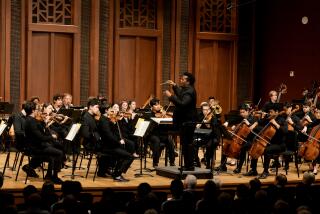JAZZ REVIEW : Quartet West Visits the Past With a Presence
- Share via
NEWPORT BEACH — Dreams and nostalgia are the business of Charlie Haden’s Quartet West. Playing the Hyatt Newporter, Haden’s foursome transported the audience across time and space to the glory days of bygone Hollywood with a program of songs that recalled the romance and the creative energy of those times.
Haden didn’t waste words introducing the band’s concept as it took the stage. It’s well-known that the quartet’s music, a mix of be-bop generation numbers and romantic originals, is inspired by a period 50 years past. Instead, Haden listed the tunes the group would perform Friday, then let the music set the tone. No verbal explanation was necessary.
While the songs, including Lee Konitz’s “Palo Alto” and Haden’s “Hello My Lovely,” established the dreamy mood, the band worked solidly from the here and now, playing with the kind of musicianship more characteristic of the 1990s than the 1940s. This may be Quartet West’s greatest strength, being able to generate a sense of the past while working from a musical perspective that’s thoroughly modern.
That perspective provides a definition of the current West Coast sound better than any other ensemble working today. There is no Haden Quartet East to complement Quartet West, as the name implies. The use of West marks the feel of his group, which is like the art of filmmaking in its power to generate background and emotional content.
The group’s enchanting ensemble sound is even more remarkable considering the strong individual personalities of its members. Saxophonist Ernie Watts plays with fire and over-the-top emotion; pianist Alan Broadbent is a cool classicist with lush chordal ways; drummer Larance Marable is surprisingly reserved and understated; Haden combines folky sensibilities and revolutionary spirit in his bass playing.
These contrasting styles fall together in a seamless way in Quartet West. The boppish “Palo Alto” featured Broadbent and Watts hustling the theme in unison, before Watts broke off to pursue an insistent improvisation that gave him little time to catch a breath. Broadbent followed in more relaxed style, delving into Bill Evans sensitivity and Art Tatum chordal play. Haden’s firm, deliberate solo stood in contrast, moving at the sort of careful pace one uses to negotiate stepping stones in a wide, rushing stream.
Broadbent opened “Hello My Lovely” with a flourish-filled introduction that led to his chord-packed solo. Watts, despite the slower tempo, compressed flurries of notes into long-winded runs, bringing a sense of tension and anguish to the otherwise somber ballad. Marable’s brushwork stirred Haden into one of his most heartfelt presentations.
Each song extended the romantic sense of place. Haden’s “Child’s Play,” with its strong Latin feel, gave exotic airs to the otherwise civilized sounds. The melodic “First Song” fell into the reflective ballad category, as did Broadbent’s “The Long Goodby” and Haden’s “Always Say Goodby,” two tunes that generated a Raymond Chandler-like mood. “Body and Soul” fit perfectly into Haden’s dreamy scheme.
While the tunes were effectively sequenced, many of them have been aired previously by Quartet West in other Orange Count performances, both here and during last year’s appearance at the Orange County Performing Arts Center. A pleasant change was the inclusion of Bud Powell’s “Blue Pearl,” an up-tempo number that gave both Watts and Broadbent a chance to show their bop chops.
Sadly, the Newporter’s sound system occasionally marred the proceedings.
Haden’s solo on “Hello My Lovely” was so badly amplified it sounded as if it was being plucked on rubber bands. The Newporter piano was still in need of tuning; the problem was apparent earlier last week during the Christian McBride-Eric Reed double bill but apparently not corrected. The off tuning, coupled with poor miking, often gave Broadbent’s work the undignified air of the tinkling piano played by Schroeder in “Peanuts” cartoons.
Still, Quartet West succeeded in creating a moody, dramatic landscape. Just imagine what they could do under dream conditions.
More to Read
The biggest entertainment stories
Get our big stories about Hollywood, film, television, music, arts, culture and more right in your inbox as soon as they publish.
You may occasionally receive promotional content from the Los Angeles Times.









